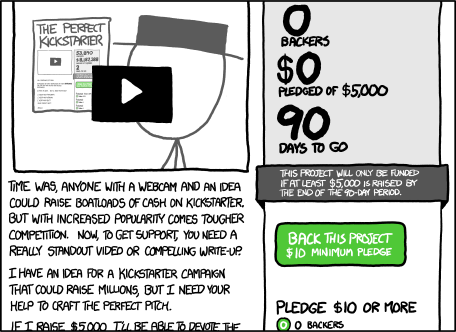If you are unfamiliar with Songkick, in a nutshell they make it easy for you to track bands you want to see play. This new launch is part of a growing trend of crowd-sourced funding projects, or 'crowdfunding.' In essence, pay Songkick upfront for tickets to a gig that you want to make happen. If enough people all do the same, that gig will then take place. Neat idea for fans of less mainstream artists that might not otherwise be willing to take the risk of booking a gig. This is guaranteed business: the customers have said they will pay, so the risk is removed.
The Songkick project comes not long after the launch of Kickstarter in the UK. Perhaps the best known crowdfunding site, the US version of Kickstarter launched in 2009. According to their site, since then:
...over $350 million has been pledged by more than 2.5 million people, funding more than 30,000 creative projects.Staggering. Yet so plainly sensible. People have astoundingly good ideas, but don't have access to the funds to make those ideas real. Individuals can review what these ideas are, and provide support to those they would want to have access to as a consumer.
In a world where new businesses can really struggle to reach sustainability, why wouldn't you start by having those people that want to buy your stuff fund your set up?
What does this mean for my industry? A search on Kickstarter brings back 340 projects in publishing. For authors in niche areas, this could have huge implications for choosing to self-publish. Before any production work is undertaken, they can identify who is going to buy their book. For the scholarly author, notably the monograph author where it isn't uncommon to sell only 50 copies of a title, this is clearly significant.
But (and this is a big but) not all projects will get funded: there are time periods set, and if funding goals are not reached, the project doesn't go ahead.
So this is the most significant point, from my point of view as a PR/Marketeer. To me, the benefits of crowd-funded projects are plainly sensible, but I can see that the model benefits businesses as well as individuals. There will, I believe continue to be an important role for publishers, and notably in providing the promotion and marketing of a project to enable it to stand out from the crowd. The XKCD cartoon above says it all: not only will you need a Kickstarter listing, your Kickstarter page has to be more awesome than every other page on the site if you want anyone to sit up and take notice.
In an environment where there's a lot of criticism over what 'value' publishers bring, expertise and scale in getting the word out about a project will be what makes some initiatives succeed where others fail. It's all well and good suggesting that 'anyone' can do this. Sure, anyone can set up a blog and have a presence, anyone can have a twitter feed and make their virtual presence felt. But there will only ever be a few who really achieve that success. For the majority, the experts in PR and Marketing will continue to play a really valuable role.
There's also potential here for publishers in supporting new authors or niche areas: drive selection via the buyers, then invest in the high quality production and add on services once there's a clear demand.
I'm excited to see where and how this evolves.

No comments:
Post a Comment